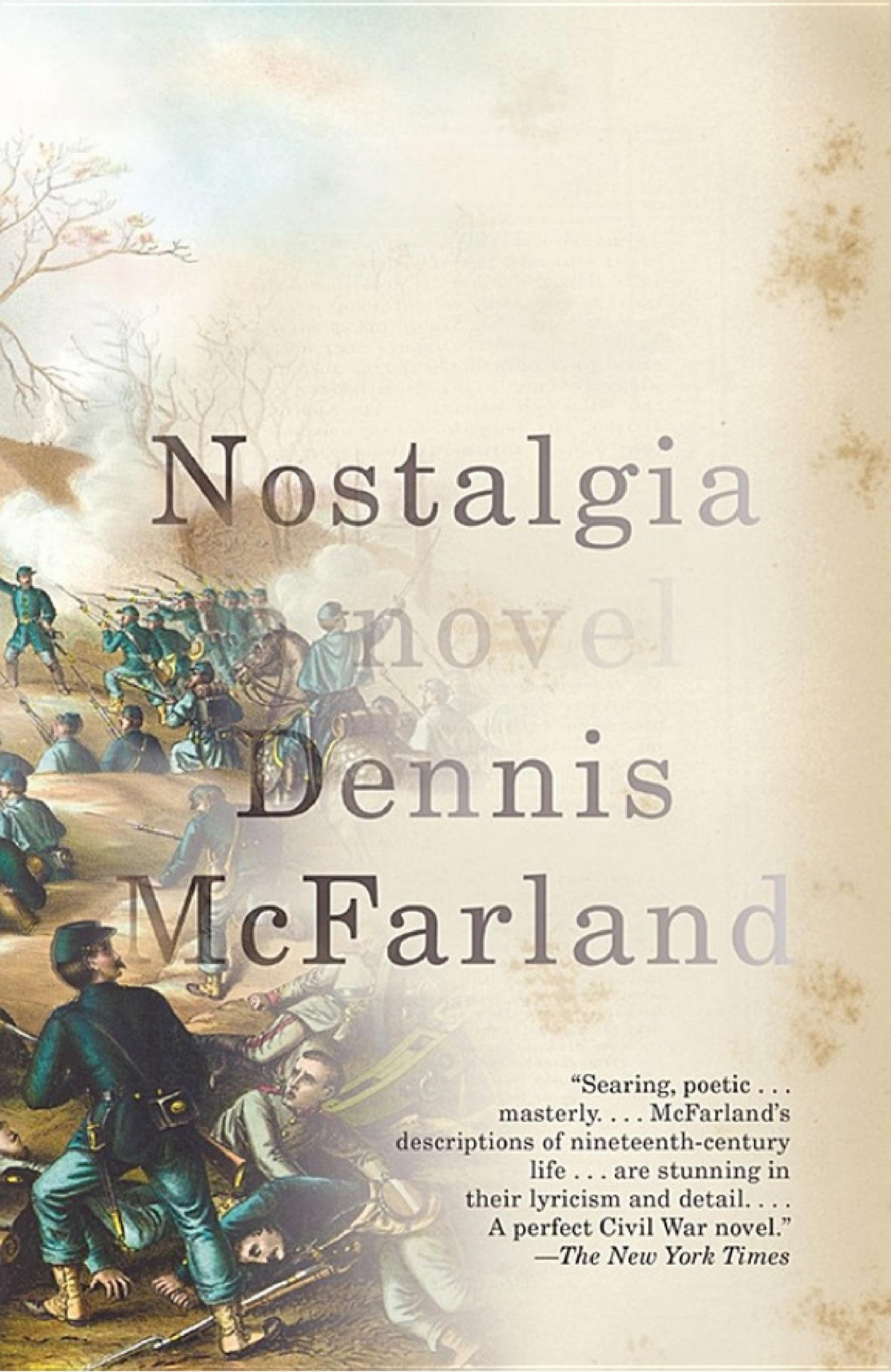
Nostalgia
A Novel
- اطلاعات
- نقد و بررسی
- دیدگاه کاربران
نقد و بررسی

July 15, 2013
In McFarland’s emotionally harrowing Civil War novel, Summerfield Hayes is a 19-year-old Brooklynite, living on Hicks Street and pitching for one of the local “base ball” teams. Over the objections of his older sister, Hayes enlists in the Union Army and ends up taking part in the Battle of the Wilderness. Wounded, he winds up in a hospital in Washington City, where his doctors see that the horrors of battle have rendered him mute and incapable of even signing his own name, and diagnose him as suffering from a medical condition then called nostalgia. Hayes is cared for by, among others, a ward matron and a bearded hospital volunteer named Walt whose identity should be immediately apparent to anyone who knows anything about 19th-century American poets. Employing three alternating narrative strands—Hayes’s idyllic life in his native Brooklyn, his horrifying battlefield experiences, and his nightmarish hospital recuperation—McFarland manages to find something new to say about a war that could have had everything said about it already. In the end, this is a moving account of one soldier’s journey to hell and back, and his struggle to make his own individual peace with the world afterward.

September 1, 2013
A Civil War novel from Vermont-based author McFarland (Letter from Point Clear, 2007, etc.) that, like The Red Badge of Courage, focuses on the horror of battle as well as on the psychology of the soldier. Summerfield Hayes signs up to fight for the Union for several reasons, some of them better than others. He's from Brooklyn and was recently made an orphan when his parents died in an accident while visiting Ireland. Strangely, but perhaps most importantly, he feels the need to get away from his older sister, Sarah, for whom he has quasi-incestuous feelings. In 1864, he finds himself fighting in the Battle of the Wilderness in Virginia. Wounded by shrapnel and bleeding badly, he's abandoned by his regiment but eventually wends his way to an Army hospital in Washington, D.C. Temporarily unable to escape, he listens closely to the conversations of his wounded comrades and is also subject to the tender ministrations of a nurse--Walt Whitman. It's a matter of concern and outrage when an officious captain comes into the hospital and berates Hayes for being a deserter. Before the war, Hayes had been an outstanding baseball player, and early in his Army career--before the horrors of the Wilderness--he was instrumental in helping to set up a friendly rivalry between two competing teams. (It's amusing that since there has to be some kind of rationale behind the teams, it's decided to have single men on one team and married men on the other.) The captain investigating Hayes believes he's now malingering simply so he can go back to New York and play baseball once again. Using a complex, effective narrative strategy, McFarland moves us confidently from battlefield to hospital to baseball diamond as well as through dream, reverie and memory. A distinguished addition to fictionalized narratives focused on the Civil War and its aftermath.
COPYRIGHT(2013) Kirkus Reviews, ALL RIGHTS RESERVED.

November 1, 2013
This Civil War novel by respected novelist McFarland (Prince Edward, 2004) tells the story of young Union soldier Summerfield Hayes. By switching seamlessly between harrowing scenes of combat (at the Battle of the Wilderness), wartime recreationwith an emphasis on base ball (apparently the contemporary usage), at which Hayes excelsand Hayes' postbattle, disoriented wandering and later hospitalization (where his muteness is regarded as malingering), as well as his childhood and recuperation at his Brooklyn Heights home, McFarland portrays a troubled if multidimensional character. The tragically accidental loss of both parents has affected both Hayes and his sister, Sarah, with whom he has an unusual bond. The ministrations he receives from Walt Whitman add a literary touch to this deliberately paced novel, and the touchingly sympathetic characterization of Whitman will appeal to many readers, as might the base ball. (Reprinted with permission of Booklist, copyright 2013, American Library Association.)

May 15, 2013
McFarland, already a best-selling author, is here being positioned for even bigger things. In winter 1864, 19-year-old Brooklynite Summerfield Hayes joins the fighting but soon finds himself abandoned by his comrades during the Wilderness Campaign. At a military hospital, Walt Whitman becomes his advocate.
Copyright 2013 Library Journal, LLC Used with permission.

August 1, 2013
The Battle of the Wilderness (May 5-7, 1864) is remembered as one of the most infamous and critical battles of the Civil War. Summerfield Hayes, an earnest and well-intentioned young man, impulsively enlists in the Union Army and finds himself in brutal hand-to-hand combat, hoping to lose himself in the experience and escape the inappropriate feelings he has developed for his older sister. He achieves his first desire after receiving a savage blow to the head--he loses his voice, his sense of self, and his ability to distinguish among memory, reality, and dream. Author McFarland has written eloquently about loss and grief in a number of acclaimed novels (The Music Room; Singing Boy) and he returns to these themes again in this powerful, moving new book. By capturing the kaleidoscopic, hallucinogenic nature of warfare persuasively, he skillfully brings his psychologically shattered protagonist through the difficult journey and returns him to health and sanity--kindness and compassion are what saves him. The characters here are especially well drawn, including a genial and wise old hospital volunteer named Walt Whitman. VERDICT Masterful writing recommended for Civil War buffs and fans of literary fiction. [See Prepub Alert, 4/22/13.]-- Patrick Sullivan, Manchester Community Coll., CT
Copyright 2013 Library Journal, LLC Used with permission.




دیدگاه کاربران